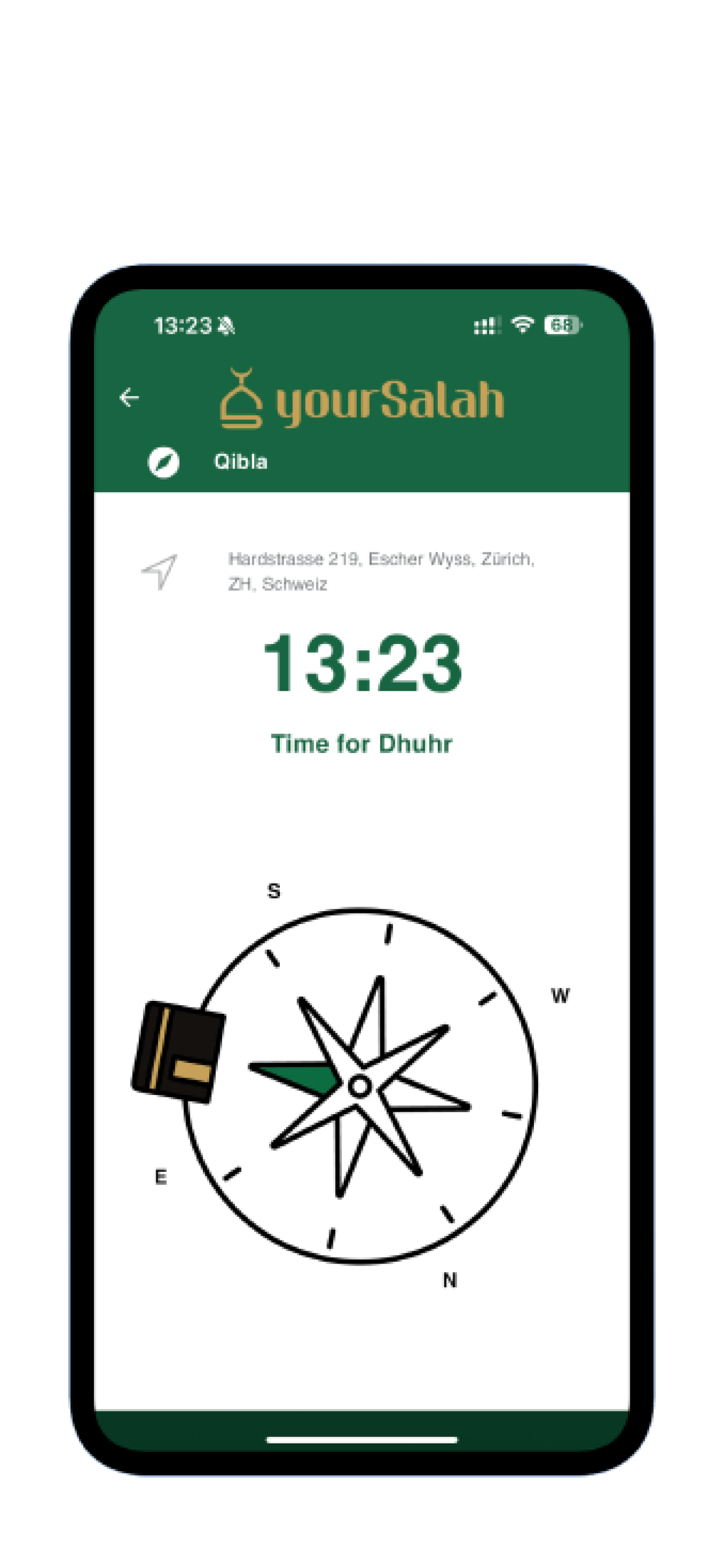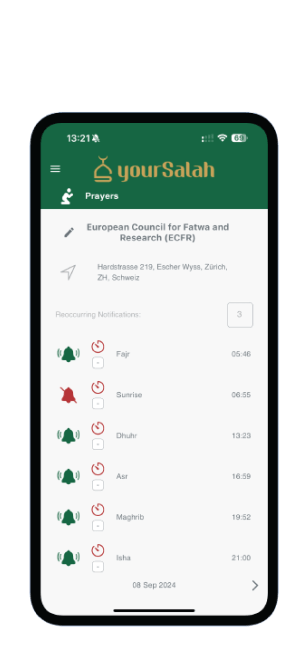Shab-e-Meraj, also known as Lailat al-Mi’raj (The Night of Ascension), is one...
Read MoreShab-e-Meraj, also known as Lailat al-Mi’raj (The Night of Ascension), is one of the most spiritually significant nights in Islam. This miraculous...
yourSalah offers a “Pray Now” feature that provides a clear and focused way to engage in prayer. Simply select your prayer intention and, if you wish, set a timer for your desired duration.


You can configure push notifications to remind you on all your five daily prayers. These reminders encourage you to stay connected with Allah (swt), even during your busiest moments.
It’s all there! Prayer time based on my location, Qibla finder, different prayer time conventions and highly flexible. Everything is adjustable. Love this App.
As someone who struggled with consistency in prayer, yourSalah has truly transformed my routine. The Adhan reminders are so helpful, and I love how the app keeps me mindful of my Salah times even on busy days. Highly recommend this to every Muslim! .
This app is exactly what I needed! The Qibla direction finder works flawlessly, even when I travel, and the prayer reminders ensure I never miss a Salah. JazakAllah khair for such a beneficial tool!
I’ve tried many prayer apps before, but yourSalah is by far the best. The clean and simple interface makes it easy to use, and I appreciate the spiritual reflections that keep me motivated. May Allah (swt) reward the developers for this amazing effort!
This app is a must-have! It keeps me accountable with my prayers and provides so much Islamic knowledge. The fact that it doesn’t bombard me with ads like other apps is a huge plus. I’ve recommended it to all my family and friends!
Before using yourSalah, I struggled with remembering my Salah times, especially at work. Now, with the gentle reminders and customizable alerts, I feel more at peace knowing I’m staying on track. May Allah bless this initiative!
Youm e Ali marks the birth anniversary of Hazrat Ali (RA), the fourth caliph of Islam, known for his unparalleled wisdom, bravery, and justice. Muslims reflect on his contributions to Islam and his devotion to Allah.
Shab-e-Meraj: The Night of Ascension
Shab-e-Meraj, also known as Lailat al-Mi'raj (the Night of Ascension), commemorates the miraculous journey of the Prophet Muhammad (pbuh) from Masjid al-Haram in Mecca to Masjid al-Aqsa in Jerusalem, and then his ascension to the heavens by the will of Allah (swt). This journey, known as Isra and Mi'raj, is detailed in the Quran and Hadith.
**The Journey (Isra):**
The Prophet Muhammad (pbuh) was taken on a night journey from the Kaaba in Mecca to Masjid al-Aqsa on a celestial steed called Buraq. This journey symbolizes the spiritual connection between Mecca and Jerusalem.
**The Ascension (Mi'raj):**
From Masjid al-Aqsa, the Prophet (pbuh) ascended to the heavens, where he met various Prophets, including Adam, Ibrahim, Musa, and Isa (peace be upon them all). He also witnessed the wonders of paradise and the torments of hell.
**The Command of Salah:**
During Mi'raj, the Prophet Muhammad (pbuh) received the divine command of five daily prayers, which are obligatory for all Muslims. This is one of the most profound aspects of the event, emphasizing the importance of Salah in Islam.
**Lessons and Blessings:**
Shab-e-Meraj teaches Muslims the significance of spiritual elevation, the power of faith, and the closeness one can achieve with Allah (swt) through devotion and prayer.
**How Muslims Observe Shab-e-Meraj:**
- **Night Prayers:** Many Muslims spend the night in worship, offering Nafl Salah (voluntary prayers) and reciting the Quran.
- **Dua and Dhikr:** Supplications and remembrance of Allah (swt) are emphasized, seeking His mercy and blessings.
- **Reflection:** Muslims reflect on the spiritual lessons of Shab-e-Meraj and renew their commitment to Salah and other acts of worship.
Shab-e-Meraj is a night of immense spiritual significance, reminding believers of the power of faith and the mercy of Allah (swt).
Shab-e-Barat, the Night of Forgiveness, is observed by Muslims as a time of seeking Allah's mercy, blessings, and forgiveness. Many people offer special prayers, fast the next day, and reflect on their deeds.
Ramadan is the holiest month in Islam, marked by fasting, increased prayer, and Quran recitation. Muslims fast from dawn to sunset to strengthen their faith and seek Allah's blessings.
Laylat al-Qadr, also known as the Night of Power, is considered the holiest night in Ramadan. Muslims believe prayers on this night hold immense reward, equivalent to a thousand months.
Eid ul-Fitr is a celebration marking the end of Ramadan. Muslims gather for prayers, enjoy festive meals, and share blessings with family and friends.
Waqf Al Arafah is the most important day of Hajj. Pilgrims gather on Mount Arafah to pray and seek forgiveness, while other Muslims observe fasting.
Eid ul-Adha commemorates Prophet Ibrahim's (AS) willingness to sacrifice his son for Allah. Muslims perform Qurbani (sacrifice) and distribute meat to the needy.
1st Muharram marks the beginning of the Islamic New Year, a time for reflection and renewal of faith.
Ashura commemorates the martyrdom of Imam Hussain (AS) at Karbala, symbolizing the eternal struggle for justice and truth.
Shab-e-Meraj, also known as Lailat al-Mi’raj (The Night of Ascension), is one of the most spiritually significant nights in Islam. This miraculous...
According to Al-Tabari, wudu is a moment of reflection and introspection. It allows believers to pause and prepare their hearts for...
Shab-e-Meraj, also known as Lailat al-Mi’raj (The Night of Ascension), is one of the most spiritually significant nights in Islam. This miraculous...
Shab-e-Meraj, also known as Lailat al-Mi’raj (The Night of Ascension), is one...
Read MoreAccording to Al-Tabari, wudu is a moment of reflection and introspection....
Read MoreSalah is not only a central act of worship in...
Read MoreThe Comprehensive Nature of Faith – Reflections on Surah Al-Baqarah...
Read More